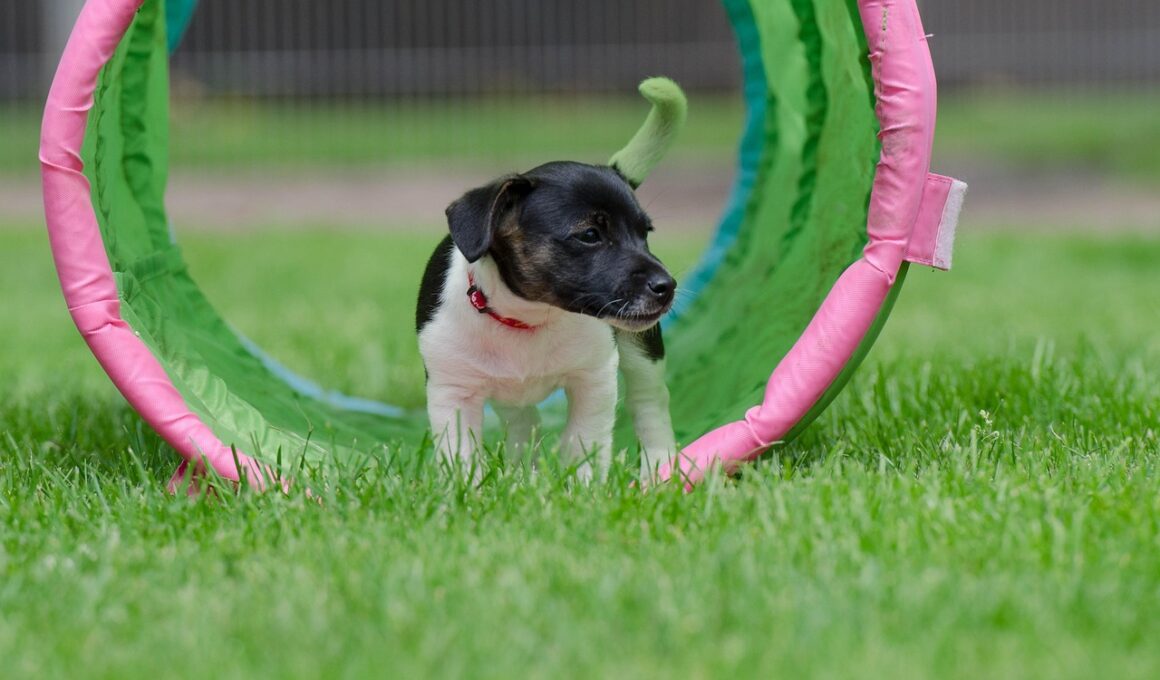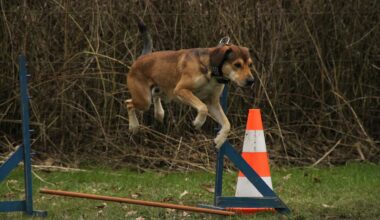Socialization Dos and Don’ts for Newly Adopted Rescue Dogs
Socializing a rescue dog requires patient and thoughtful approaches to help them transition successfully into a new home. To start, introduce your rescue dog gradually to various environments and experiences while establishing a secure routine. Implement short interactions with new people or pets to prevent overwhelming your dog. Always observe their body language to gauge comfort levels. If they show stress signals, be ready to retreat, allowing them to decompress and build confidence in their settings and surroundings. Always start socialization in controlled environments where distractions are minimal. Working on basic commands like ‘sit,’ ‘stay,’ and ‘come’ can reinforce obedience and enhance bonding. Consider using treats to positively reward your dog for good behavior during these introductions. Also, engage with them regularly in social activities, but avoid flooding them with too many stimuli at once. Consistency is key, as it fosters familiarity and trust, eventually leading to healthier interactions with others. Use positive reinforcement techniques when your dog successfully engages with their environment or new friends, turning these experiences into enjoyable adventures. Remember, socialization is a gradual process that can greatly enhance your dog’s overall well-being.
Creating a Positive Environment
Always ensure the space where your newly adopted rescue dog explores is safe and welcoming to help foster socialization. Begin with familiar surroundings, such as your home or yard, where your dog feels comfortable. Identify potential stressors—like loud noises or sudden movements—and minimize their presence to ease your dog’s anxiety. Gradually increase exposure to new stimuli, like different people, pets, and nature. Scheduling regular outings can also promote exploration; parks are ideal locations to meet other dogs while remaining vigilant about their interactions. Encourage healthy friendships by allowing them to approach others at their pace, emphasizing patience in social settings. Note that rewarding positive social behavior with treats will foster associations between new experiences and comfort. Use a crate or designated safe spot for moments when your rescue puppy needs alone time to recharge. Allow them to retreat whenever they feel overwhelmed. This strategy not only shapes a positive perception of new environments but also reassures your dog that they can communicate their needs and emotions. Furthermore, attending organized training sessions can assist in improving both your training skills and your dog’s social competence.
In addition to being in a safe space, it’s essential to understand your rescue dog’s unique personality traits and background to establish effective socialization strategies. Every dog is an individual, which means each might have different triggers, fears, or preferences. Take the time to familiarize yourself with your pet’s past experiences before adopting them, as these factors will significantly influence their comfort levels in social settings. If your dog seems fearful of certain aspects, like loud noises or other dogs, create a personalized plan to address these issues slowly. Use the power of positive reinforcement to reward small achievements during social encounters. You might gently encourage your dog to interact with trustworthy animals, ensuring they have a positive association with different social situations. Consider engaging your dog in structured activities like obedience classes coupled with positive reinforcement for optimal learning. Socialization is a continuous process; therefore, it is vital to regularly revisit and adjust your approach as necessary basis on your dog’s evolving comfort levels and preferences. This adaptability can significantly contribute to your dog’s emotional resilience and social confidence.
Exercise and Play
Engaging your rescue dog in regular exercise and play is vital for building strong social connections. Physical activity not only promotes a healthy lifestyle but also plays a crucial role in enhancing socialization opportunities. Take your dog for daily walks, allowing them to encounter different sights, sounds, and other dogs. During these excursions, encourage appropriate interactions with new friends. Opt for structured environments like dog parks or community classes where they can engage with other dogs safely. Observing playful behavior amongst dogs can reduce fear while assisting your pet in understanding social cues through positive experiences. Stay vigilant and monitor their body language to ensure both your dog’s comfort and safety, so they feel secure in their interactions. Enhancing the experience by bringing their favorite toys can provide motivation and promote active play. Create opportunities for variety by changing locations and ensuring that play sessions are engaging and enjoyable. Always supervise interactions, especially with larger dogs, ensuring no one becomes overwhelmed during the playtime. Remember, the goal is to create positive and fun experiences that allow your rescue dog to thrive socially and emotionally.
Incorporating training into socialization activities provides the dual advantage of improving behavior and enhancing social skills. Attend group classes where your rescue dog can learn obedience while interacting with others. Choose a class that prioritizes positive reinforcement techniques. These methods stimulate your dog’s focus on learning rather than fixating on potential distractions. Furthermore, the group setting serves as a fantastic way for your dog to gradually meet various personalities within a controlled environment. Continue reinforcing good behavior at home by practicing commands and social exercises frequently. Set realistic goals while introducing new commands gradually to prevent overwhelming your dog. Each positive interaction or learning moment reinforces their trust in you. A relaxed environment encourages a safer learning atmosphere. You may also find puppy training clubs or local meet-ups helpful in continuing social engagement. The combination of training and social activities allows the relationship between you and your dog to develop. This not only promotes a harmonious lifestyle but also fosters an authentic bond, allowing your rescue dog to gain confidence through learning and socializing. Your dedication to both training and socialization can significantly impact your dog’s overall adjustment to their new life.
Be Patient and Consistent
Patience is vital when nurturing a newly adopted rescue dog’s socializing abilities. Each dog adjusts to new environments at their own pace. It’s essential to approach socialization as a gradual process rather than a quick fix. Consistency in routines and approaches offers your dog a sense of security during their transition. Ensure you establish and stick to training and socialization schedules that suit your dog’s energy levels and routines. Their comfort levels dictate how quickly they adapt, so remember to honor their needs and respect boundaries. Positive reinforcement should consistently be employed, rewarding your dog’s efforts to engage in social situations. Monitor their behavior closely to identify triggers and adjust your approach accordingly. If you sense a setback, it’s not unusual; rather, focus on small victories. Continue encouraging your dog in the face of challenges, reinforcing desirable behaviors with praise or treats. Celebrate small milestones to create confidence, as they start to enjoy socializing more than before. The journey of transforming a rescue dog into a well-socialized companion can be demanding, yet the rewards are well worth the effort.
Finally, consider connecting with fellow dog owners for shared experiences and advice on rescue dog socialization. Forming a support network can be invaluable as you navigate this process. Embrace local resources such as community pet stores, training facilities, or doggy daycare centers that prioritize socialization and welfare. Engaging in conversations with others who face similar challenges can offer insights into effective strategies that worked for them. Utilize online forums and social media platforms to share experiences, tips, and resources. You can also learn about local events where dogs gather to play and socialize, providing more opportunities for growth. Documenting your dog’s progress fosters a sense of accomplishment and provides a positive reminder of your efforts. Over time, you’ll observe significant transformations in your rescue dog, as they become more confident in their social abilities. Enjoy the process; celebrate the adjustments, no matter how small, by showering your dog with love and encouragement. Building social skills and creating positive experiences for your rescue dog can lay the foundation for a fulfilling, happy life together. So persevere through challenges and revel in companionship.


